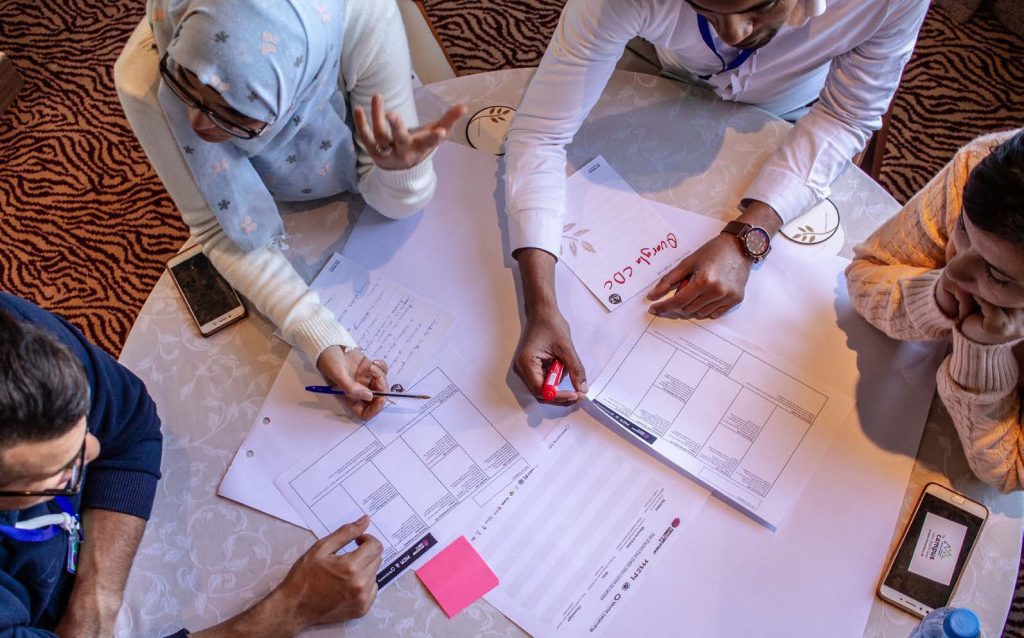-
What We Do
- WHERE WE WORK
-
About Us
 Welcome Message from Carol Jenkins
Welcome Message from Carol JenkinsFor more than 90 years, World Learning has equipped individuals and institutions to address the world’s most pressing problems. We believe that, working together with our partners, we can change this world for the better.
On my travels, I’ve had the opportunity to meet with many of those who have joined us in this mission. In Baghdad, we’ve trained more than 2,300 Iraqi youth who are already giving back at home. In London, our partners in the TAAP Initiative strongly believe that we are all responsible to practice inclusion. And in Vermont, our Experiment in International Living and School for International Training participants prove every day that they have the tools and the determination to change the world.
Please join us in our pursuit of a more peaceful and just world.
- Get Involved
Media Center > Story
World Learning Launches a Free Tool for Assessing Soft Skills, Entrepreneurship & Civic Values
October 7, 2020

Developing soft skills, such as those related to communication, decision-making, and social interaction, is a top priority for youth workforce and entrepreneurship programs around the world. However, measuring participants’ progress in these areas can be challenging. To help take the guesswork out of this process, World Learning has developed a new, free tool that can be used to track and assess changes in soft skills both at the individual and group level.
Now available to download in English and French, with Arabic versions under development for several countries, the WorkLinks Skills and Values Assessment (WLSVA) is designed to measure a range of soft skills and civic values.
Dr. Catherine Honeyman, senior youth workforce specialist at World Learning, says the team was inspired to create WLSVA after realizing the existing options didn’t meet their needs.
“We looked at dozens of assessment tools, but we couldn’t find one that could be used to evaluate all of the skills and ideas that were important for us and our programs,” she says.
With that goal in mind, World Learning gathered a team of experts in education, workforce development, and monitoring and evaluation to collaboratively produce the new assessment.
The tool they created utilizes a questionnaire to gauge participants soft skills, such as their ability to set goals, persevere, and manage their emotions, as well as earning skills, such as those related to the job search and to entrepreneurship. It also assesses certain civic values, which are based on World Learning’s own institutional values of community and civic engagement, intercultural understanding and empathy, social inclusion and justice, and sustainability.
“This is a unique feature of the WorkLinks tool,” says Honeyman. “There are other tools that focus on civic participation and civic attitudes, but nothing that integrates these issues into a soft skills assessment. These are all skills and values that we believe will make a difference in the lives of youth and help them improve their communities as well.”
While the initial aim was to create an assessment that could be given at the beginning and end of a program to measure participants’ progress throughout the program, Honeyman says the tool could have other applications as well. This includes comparing skills between different populations or finding ways to adapt a program curriculum to better fit the needs of a specific group.
“Evaluating skills at the beginning of a program helps us provide more targeted support to participants, which helps create better program outcomes,” she says.
World Learning piloted the tool in Algeria with youth ages 16–36 over a nine-month period. Since the questionnaire was originally developed in English, the team first conducted focus groups to refine the Algerian French language version and ensure it incorporated colloquial language used by youth and fit the local cultural context. The team then conducted multiple rounds of validation testing to validate the assessment and found that WLSVA was highly accurate and reliable. A full report on the validation process is available on the WLSVA webpage.
Now that the tool has been validated, World Learning has decided to make it freely available for institutions and organizations to use under a Creative Commons license (CC-BY-NC-SA) that allows them to translate and use it for non-commercial purposes as long as they credit World Learning and license any adapted versions under the same terms.
“So many of the tools out there aren’t accessible due to cost or other factors,” Honeyman says. “We wanted to offer an alternative that any organization can use to assess and improve its programming.”
This research was supported by a grant from the U.S. Department of State’s U.S.-Middle East Partnership Initiative (MEPI) program. The views expressed in this report are those of the author and do not represent the views of, and should not be attributed to, the U.S. Department of State or MEPI.





